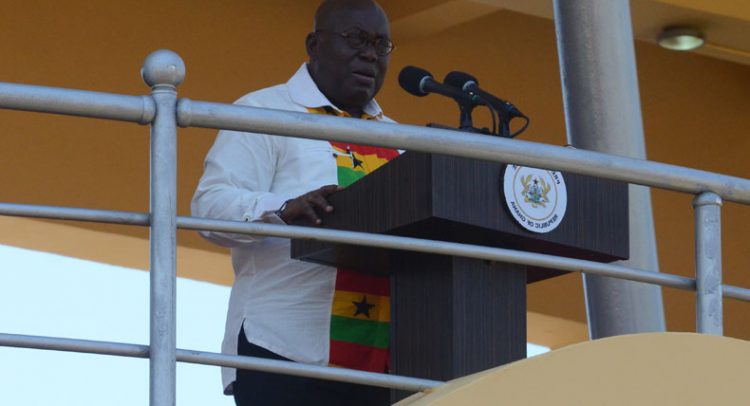President Nana Akufo-Addo
President Nana Addo Dankwa Akufo-Addo has called for value addition to Ghana’s exports to help achieve his ‘Ghana Beyond Aid’ vision.
Speaking at the 61st Independence Anniversary celebration yesterday at the Black Star Square in Accra, he said cocoa farmers, for example, get less than 10 percent of the value of a bar of chocolate and yet cocoa is the main ingredient.
“On the world market, bauxite, in its raw form, is worth about $42 per metric tonne. Processing it just one stage further into alumina oxide will fetch twice that amount. Refining the alumina oxide into alumina will increase the value by seven times, and smeltered aluminium fetches one hundred fold what it gets in the raw state. Aluminium, we are told, is the metal of the future.”
For this reason, the President said his administration would establish an integrated bauxite and aluminium industry within the next three years.
“Work on the law establishing an Integrated Bauxite and Aluminium Development Authority is far advanced, and will be submitted to Parliament very shortly. Government also hopes to reach an agreement soon with potential partners to establish an alumina refinery, and expand the VALCO smelter. A successful execution of this project will be key in moving Ghana beyond Aid, as will be the successful exploitation of our iron ore and manganese deposits to build a steel industry for our country and the region.”
Poverty in spite of resources
Emphasising that Ghana is endowed with many natural resources such as gold, bauxite, iron ore, diamonds, oil, natural gas, timber, cocoa, water, fertile land etc, he noted: “The truth, however, is that the state of our nation does not bear out that we have these natural endowments. Poverty continues to be our lot. Mismanagement, corruption and high fiscal deficits have become the hallmarks of our economy, which we finance through borrowing and foreign aid.”
“It is time to pursue a path to prosperity and self-respect for our nation. A Ghana Beyond Aid is a prosperous and self-confident Ghana that is in charge of her economic destiny; a transformed Ghana that is prosperous enough to be beyond needing aid and that engages competitively with the rest of the world through trade and investment. It is possible.”
Exploitation
“We are all aware of the vast sums of illicit financial flows from our continent that attend the exploitation of our natural resources, especially of our mineral wealth. We can no longer continue to blame others for that.
“My government is going to implement an alternative financing model to leverage our bauxite reserves, in particular, to finance a major infrastructure programme across Ghana. This will probably be the largest infrastructure programme in Ghana’s history, without any addition to Ghana’s debt stock. It will involve the barter or exchange of refined bauxite for infrastructure. We expect to conclude this agreement and start its implementation this year. This will represent a paradigm shift in the financing of our development priorities and make
it possible for Ghana to move beyond aid.”
Economic comparisons
He further recalled the time of Ghana’s independence when she had peers such as Malaysia, South Korea and Singapore.
“Our per capita incomes were very similar at around four hundred and fifty United States dollars ($450) in 1960, and our economies were dependent on the production of primary commodities. Today, these countries, once our peers, have significantly transformed themselves into industrialized economies.
“Income per head in Singapore is now at fifty one thousand, four hundred and thirty one United States dollars ($51,431), South Korea at twenty nine thousand, one hundred and fifteen United States dollars ($29,115) and Malaysia at nine thousand, six hundred and twenty three United States dollars ($9,623) compared to Ghana’s at one thousand, one hundred and fifty two United States dollars ($1,512). We are still dependent on the export of primary commodities, as was the case at the time of Gordon Guggisberg. We must admit, sadly, that in the area of economic development, we have underachieved, relative to our peers at independence.”
By Samuel Boadi


